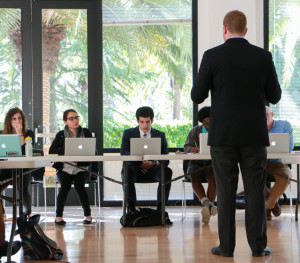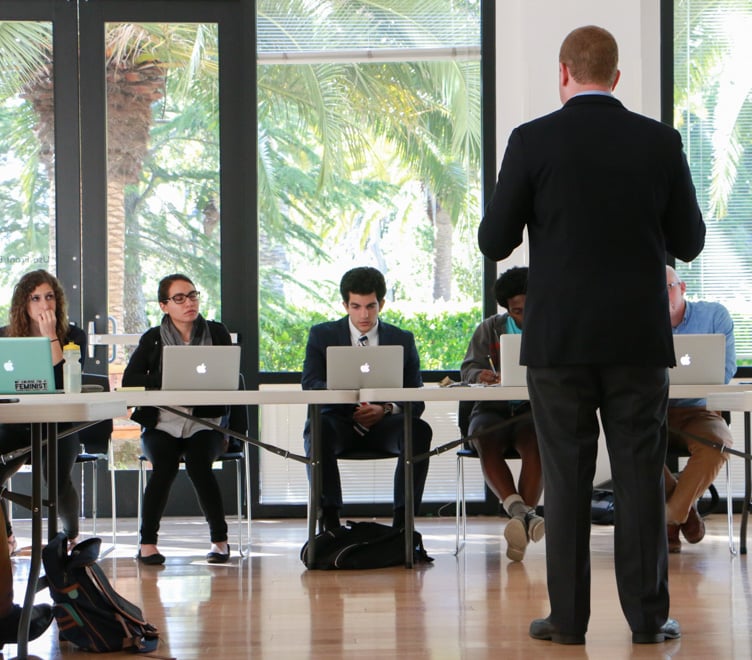
The ASSU Constitutional Council heard oral arguments Sunday night for The Stanford Review v. The Stanford Students of Color Coalition (SOCC). The case was brought to the council after SOCC refused to turn over endorsement interview records to The Stanford Review.
The Review argued that SOCC violated Article 1, Section 7, of the ASSU constitution, which states, among other things, that “all records of any Association entity must be available for scrutiny by the public.” However, because an “Association entity” is never explicitly defined, there is ambiguity as to whether Volunteer Student Organizations (VSOs) and coalitions of Volunteer Student Organizations, such as SOCC, qualify as Association entities.
Brandon Camhi ’16, the Stanford Review’s editor-in-chief and representative in the case, claimed that SOCC qualifies as an Association entity, based on the language used in Article 1, Section 7 — specifically, an exemption that excludes “financial records for non-funded accounts of organizations banking with the Association” — and SOCC’s legal association with ASSU.
“The fact that the constitutional clause takes the time to specifically exempt non-funded accounts of student organizations suggests that the rule applies to VSOs other than that narrow exception,” Camhi said. “Frederik Groce, the [ASSU Financial Manager], has told us that VSOs, including SOCC’s VSOs, are not separate legal entities from the ASSU. This point makes it clear that SOCC’s VSOs are simply six entities of the wider association governed by the constitution.”
Camhi also argued that the records the Review asked for, which included a signed SOCC endorsement contract, notes taken during the interview process and other endorsement-related documents fell under the purview of records.
Councilman Stephen Richards, who is a third-year Stanford law student, later asked Camhi about the nature of records containing personal information.
“Say I am a co-chair of some VSO, and I sent my other co-chair an email,” Richards said. “The email says we need to have a meeting of this VSO … and also, by the way, I had this awesome date … It seems that you would think the email constitutes a record … But how do we parse that, how do we separate out the stuff we want to look at and the stuff we think shouldn’t be looked at?”
Camhi responded by saying that a third party could be used to redact personal information.
Chris Russ ’15, SOCC’s primary representative in the case, expressed concern about violations of personal freedom if VSOs were considered Association entities. Russ pointed to VSOs such as those that make up the queer coalition and pointed out how members of those organizations might want their identities kept secret in order to protect themselves from potential prejudice.
“Application of [Article 1, section 7] to VSOs would also affect the privacy and confidentiality of individual association members,” Russ said. “This could particularly affect VSOs that cater to private aspects of association members’ lives or that focus on marginalized political or activist issues. Queer-identified students who are not out among their family and friends, for example, may think twice about being involved in such a group if their involvement could be made public.
Russ further expressed worry that, even with redactions, there is still the possibility of linking students to a given organization.
Russ also stated that while SOCC is not a VSO, the constitution distinguishes between VSOs and Association entities, and that in the 46 years since the constitution’s adoption, Association entities have not been explicitly interpreted to include VSOs. Also, he asserted that doing so would lead to “chilling” effects.
“Regulations that would make the internal records of all VSOs or other organizations that receive SSE [Stanford Student Enterprises] funding subject to [article 1, section 7] would invariably impair the rights of all association members to freely speak and congregate,” Russ said.
The council’s vote on the case will be made at some point in the next several days.
Contact Sam Reamer at sreamer ‘at’ stanford.edu.
